by Irina Tsukerman
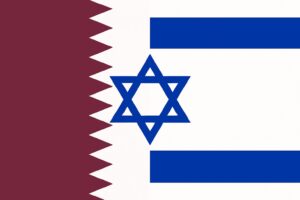
The Qatargate scandal in Israel has sent shockwaves through the political and security establishment, exposing deep concerns over alleged bribery, corruption, and foreign influence linked to Qatar. This controversy has intensified domestic turmoil, raising serious questions about governance, national security, and Israel’s diplomatic positioning in the region. As investigators dig deeper, the unfolding scandal threatens to reshape Israeli politics and the country’s strategic alliances.
Among those implicated are Netanyahu’s longtime confidants and political operatives. Chief among them is Yitzhak Molcho, a veteran lawyer and diplomatic envoy, who has been suspected of acting as an intermediary in securing financial favors from Qatar. Another prominent figure is Ari Harow, a former chief of staff to Netanyahu, who has previously turned state witness in past corruption cases. Reports suggest that Harow may have been instrumental in facilitating meetings between Qatari representatives and Israeli decision-makers, particularly concerning economic and media-related transactions.
Additionally, the scandal has drawn in Ron Dermer, Netanyahu’s former ambassador to the United States, who has been rumored to have had informal discussions with Qatari representatives regarding diplomatic and economic partnerships. While no formal charges have been brought against Dermer, the extent of his involvement remains under scrutiny.
The Qatargate affair also has significant ties to the FIFA World Cup. Qatar’s hosting of the 2022 FIFA World Cup was marred by numerous allegations of bribery and corruption in the bidding process, and new evidence suggests that Israeli intermediaries may have played a role in brokering certain deals in exchange for political favors. These allegations point to a broader pattern of Qatari financial influence operations, which have now become a central focus of the investigation in Israel. [1]
From a legal perspective, potential charges against those involved could include bribery, money laundering, fraud, and breach of public trust. The Israeli Attorney General’s office is reportedly weighing its options as investigators sift through financial records, wire transfers, and diplomatic correspondences. If proven, these allegations could result in criminal convictions and significantly alter the political landscape in Israel. [2]
Geopolitically, the Qatargate scandal has implications beyond Israel’s domestic politics. It raises serious questions about Qatar’s ongoing influence campaigns and the vulnerability of democratic institutions to foreign financial manipulation. The controversy also plays into Netanyahu’s claims about a so-called ‘deep state’ working against him, potentially bolstering his base while further polarizing Israeli society. [3]
As the investigation unfolds, the scandal threatens to reshape Israel’s foreign policy dynamics, particularly its delicate relations with Qatar, the broader Gulf region, and Western allies concerned about transparency and governance.
The Role of Eli Feldstein, Zvika Klein, and Netanyahu’s Political Advisers

Eli Feldstein and Zvika Klein have emerged as key figures in the unfolding Qatargate scandal. Feldstein, a well-connected businessman with extensive dealings in the Gulf, is suspected of acting as a conduit for financial transfers between Qatari entities and Israeli political operatives. Investigators are examining whether he leveraged his business network to launder funds intended for political influence. Feldstein is facing additional separate charges for harming state security after an alleged leak of classified information, potentially punishable with a life imprisonment. [4]
Zvika Klein, a journalist with deep access to political circles, is also under scrutiny for allegedly serving as an informal communications bridge between Qatari representatives and Israeli policymakers. While his exact role remains unclear, reports suggest that he may have facilitated media narratives favorable to Qatari interests in exchange for undisclosed benefits. Klein, who was freed after a 12-hour interrogation, vehemently denied receiving benefits from Qatar. He is just one of at least four journalists under investigation in connection to the scandal. [5]
Two of Netanyahu’s political advisers have also come under investigation, with one of them having significant ties to Serbia. This adviser is suspected of using Balkan financial channels to obscure the origins of Qatari-linked funds. Serbia’s relatively opaque banking system and political connections to Israel may have provided a convenient route for discreet transactions. The second adviser, whose identity is still being examined, is believed to have played a role in shaping policy discussions that aligned with Qatari diplomatic and economic objectives.
These developments further complicate the scandal, adding an international dimension that could have far-reaching consequences for Israel’s foreign relations, particularly with Gulf nations and European allies tracking illicit financial flows. As the probe intensifies, the legal and political ramifications of these revelations are likely to deepen, testing Netanyahu’s administration and its ability to navigate the crisis.
Key Participants and Accusations
The scandal centers around a network of high-profile Israeli officials, lobbyists, and business figures accused of facilitating Qatari interests in exchange for financial and political favors. The investigation suggests that Qatari funds were discreetly funneled to these individuals to influence policy decisions related to Gaza, economic investments, and Israel’s regional alliances.
Among those implicated are:
Former Defense Minister Yoav Zisberg – Accused of receiving undisclosed funds to promote policies that indirectly benefited Qatari interests in Gaza.
Knesset Member Avi Shalev – Alleged to have lobbied for softer policies toward Qatar in exchange for campaign donations and business incentives.
Business Magnate Ron Ben-Moshe – Investigated for acting as an intermediary in financial transfers between Qatari officials and Israeli politicians.
Strategic Advisor Leora Hadad – Allegedly coordinated communication between Qatari representatives and key Israeli policymakers.
Former Intelligence Official Yitzhak Moran – Under scrutiny for sharing classified information that may have benefited Qatari diplomatic efforts in the region.
The Qatargate Scandal: Netanyahu’s Inner Circle Under Scrutiny
The unfolding Qatargate scandal in Israel has sent shockwaves through the country’s political establishment, placing Prime Minister Benjamin Netanyahu’s closest advisers under legal scrutiny and threatening to destabilize his government. The arrest of two high-ranking members of Netanyahu’s inner circle—Yonatan Ulrich and Eli Feldstein—has escalated into a full-blown crisis, intertwining corruption, foreign influence, and Israel’s fraught geopolitical landscape. As the investigation unfolds, Ulrich and Feldstein nearly came to blows blaming each other for the fallout. [6]
Arrests and Allegations: A Foreign Bribery Scheme?
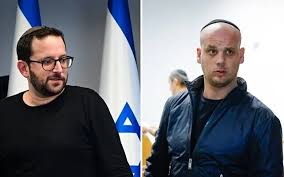
Israeli authorities arrested Urich and Feldstein on March 31, 2025, on charges related to foreign bribery and influence-peddling. Urich, a strategic advisor and longtime spokesman for Netanyahu, is suspected of facilitating financial transactions between Qatari officials and Israeli political figures. Feldstein, who previously served as Netanyahu’s media advisor, is accused of working with an international firm contracted by Doha to shape Israeli public opinion in favor of Qatari interests.
The charges levied against them include:
Contact with a foreign agent – suggesting unauthorized dealings with foreign intelligence or government representatives.
Receiving bribes – indicating financial transfers from Qatari intermediaries to promote specific narratives in Israeli media.
Fraud and breach of trust – relating to their suspected abuse of government positions for personal or foreign gain.
Money laundering – tied to attempts to obscure the origin of Qatari funds flowing into Israel.
The investigation suggests that Doha, through its financial influence, sought to ensure continued Israeli approval of Qatari cash injections into Gaza, a practice that has long been controversial due to Qatar’s ties to Hamas.
David Saig and the Deepening Intrigue of Qatargate: A Strategic Analysis

The naming of Israeli businessman David Saig in connection with the widening Qatargate scandal has added yet another layer of complexity to what is increasingly emerging not only as a corruption probe, but as a geopolitical chess game involving espionage, foreign influence operations, and the systematic erosion of national trust. [7]
David Saig’s role, though still under investigation, appears to reflect the increasingly porous boundaries between private sector interests and strategic foreign policy manipulation by hostile or competing states. As a businessman with ties to both domestic institutions and external players, Saig exemplifies the archetype of the intermediary figure—plausibly deniable, professionally networked, and potentially indispensable to covert transactional arrangements. His questioning signals the possibility that financial operations or logistical facilitation may have passed through business channels that serve as laundering mechanisms for political influence or bribery.
What makes Saig’s involvement especially noteworthy is not merely his professional profile but the nature of the allegations surrounding Qatargate: funneling of Qatari funds to political advisers, media figures, and nonprofits in Israel. If Saig acted as a conduit, intentionally or otherwise, for any such funds, it would mark a significant breach—not only of Israeli anti-corruption laws but also of the country’s national security perimeter. The concern is not limited to financial corruption but extends to strategic compromise—namely, the extent to which Qatar may have co-opted or influenced Israeli discourse and policymaking, particularly around issues such as Gaza, Hamas, and Egypt.
Furthermore, Saig’s emergence as a figure of interest ties into the broader strategy employed by Qatar: investing in individuals rather than institutions, embedding soft power influence through personal relationships, financial patronage, and covert information operations. In this context, Saig may have served—wittingly or otherwise—as a localized interface for the implementation of this foreign influence architecture. His role is not isolated, but potentially part of a triangulated strategy involving media manipulation, backchannel diplomacy, and transactional political favors.
If these suspicions are borne out, the implications are profound. First, they highlight the vulnerability of Israeli civil society and elite networks to foreign manipulation via economic levers. Second, they underscore the sophistication of Qatar’s hybrid warfare model—one that fuses corruption, media warfare, and influence operations into a seamless toolkit. Lastly, the legal fate of figures like Saig will determine whether Israel is prepared to confront the intersection of corruption and national subversion or whether these incidents will be buried beneath layers of plausible deniability and bureaucratic inertia.
It appears that David Saig may be more than just another name in a widening net. He represents a potential node in a clandestine network that threatens to erode the sovereignty and integrity of Israeli political life from within. How Israel chooses to respond will signal whether it still commands the will to police its internal lines—or whether it has become just another battlefield in a proxy war waged by foreign interests with unlimited resources and asymmetric means.
Netanyahu’s Response: Political Persecution or a True Scandal?

In a defiant press conference following their arrests, Netanyahu fiercely condemned the investigation, branding it a politically motivated “witch hunt.” He argued that his aides were being used as scapegoats in a broader campaign to weaken his leadership. Netanyahu’s choice of words, particularly his claim that they were being held as “hostages,” was met with severe backlash, especially from families of Israelis still held captive by Hamas. [8]
The Prime Minister has doubled down on his attacks against law enforcement and the judiciary, fueling suspicions that he may attempt to obstruct the investigation. His recent moves to dismiss high-ranking security officials, including the head of Israel’s domestic intelligence agency, Shin Bet, have further alarmed critics who accuse him of consolidating power amid mounting legal threats. Moreover, he filed a defamation against Yair Golan, who heads the opposition party The Democrats, after the latter sent a message accusing Netanyahu of peddling state security for money. [9] Netanyahu is simultaneously in the midst of a battle to fire the Shin Bet chief Ronen Bar, after accusing the latter of generating the crisis after the Prime Minister allegedly already made his decision to remove him. [10]
Judicial and Political Implications: A Brewing Crisis
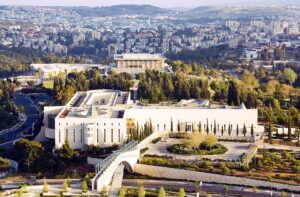
The scandal has intensified Israel’s existing constitutional crisis, as Netanyahu’s ongoing attempts to weaken judicial independence clash with the unfolding legal proceedings. The arrests have prompted calls from the opposition for a full parliamentary inquiry, while members of Netanyahu’s own coalition remain divided on how to handle the fallout. [11]
This case is also a test of Israel’s judiciary at a time when public trust in the legal system has been deeply polarized. If Urich and Feldstein’s ties to Qatari influence operations are proven, the ramifications will extend beyond Netanyahu’s immediate circle, calling into question the extent of foreign interference in Israeli politics.
Geopolitical Fallout: Qatar, Gaza, and Israeli Security
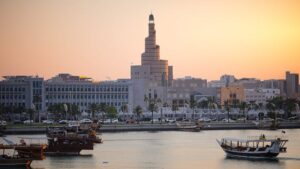
Beyond domestic politics, the Qatargate scandal has raised pressing concerns over Israel’s broader geopolitical posture. Qatar has played a key role in mediating aid to Gaza, a policy that has often divided Israeli officials. On one hand, Israeli security agencies have historically viewed Qatari cash injections as a way to prevent economic collapse in Gaza and maintain short-term stability. On the other, critics have long warned that this money indirectly empowers Hamas, further entrenching the militant group’s hold on the enclave. Recently, the Shin Bet officially formally accused Qatar of contributing to the October 7, 2023 terrorist attacks (The “Al Aqsa Flood Operation”). Doha denied that its funding facilitated terrorism. [12]
Now, with Israeli officials accused of accepting bribes to shape the discourse around Qatar’s involvement, the entire framework of Israel’s Gaza policy is under scrutiny. Netanyahu, in turn accused Shin Bet of being bribed by Qatar to instigate a scandal against him, which the agency refuted. [13] If Netanyahu’s administration is perceived as having been compromised by foreign financial influence, future security arrangements—including negotiations over ceasefires, hostages, and aid disbursements—could be severely impacted.
The Political and Legal Storm Ahead
The Qatargate scandal has exposed deep fissures within Israel’s political and judicial institutions. Netanyahu’s aggressive pushback against the investigation, combined with his broader legal troubles, suggests that the coming months will be politically turbulent. Meanwhile, the revelations of foreign influence raise critical questions about Israel’s decision-making process regarding Qatar, Gaza, and broader regional policies.
Whether this scandal results in lasting political damage for Netanyahu or merely adds to his list of controversies remains to be seen. However, as legal proceedings unfold, the implications of this case could shape not only the future of his leadership but also Israel’s broader engagement with foreign actors seeking to wield influence in its internal affairs.
Political, National Security, and Legal Challenges
The Qatargate affair poses significant legal and national security challenges. If the allegations are proven true, they could indicate a serious breach of Israel’s sovereignty and expose vulnerabilities in its political and economic systems.
Legal Claims Being Considered
Bribery and Corruption – Under Israeli law, accepting foreign financial incentives in exchange for political favors constitutes a major criminal offense.
Breach of National Security – Sharing sensitive intelligence or classified information with foreign actors could lead to espionage-related charges.
Money Laundering – Investigators are tracing financial flows to determine if illicit transactions occurred through shell companies and offshore accounts.
Election Interference – Authorities are probing whether Qatari funds were used to manipulate political campaigns and election outcomes.
Failure to Disclose Foreign Influence – Public officials are legally required to disclose foreign engagements, and failure to do so may carry legal consequences.
The scandal also raises concerns about Qatar’s ongoing support for Hamas. National security officials worry that Israeli leaders may have been compromised, leading to policies that inadvertently bolstered Hamas’s influence in Gaza.
Geopolitical Impact
Qatargate’s ramifications extend beyond Israel’s borders. Qatar has long positioned itself as a mediator in regional conflicts, but these allegations cast doubt on its true intentions. The scandal threatens to strain Israel’s relations with key regional allies, particularly the UAE and Saudi Arabia, both of whom view Qatari influence with deep suspicion.
Furthermore, the controversy could impact Israel’s standing with the United States. The Biden administration had previously engaged in diplomatic coordination with Qatar regarding Gaza, but if these allegations gain traction, Washington may be forced to reconsider its approach.
Background on Accused Israeli Functionaries
The individuals at the center of this scandal come from diverse backgrounds, including politics, military intelligence, business, and strategic advisory roles. Their influence on policy decisions has made them key players in Israel’s security and economic landscape.
Yoav Zisberg – A career politician with a focus on defense and national security. If found guilty, his past policy decisions on Gaza will come under renewed scrutiny.
Avi Shalev – A rising political figure known for his advocacy of economic partnerships in the Middle East. His connections to foreign donors were previously flagged as a potential conflict of interest.
Ron Ben-Moshe – A billionaire with investments across the Middle East, Ben-Moshe has historically maintained business ties with Gulf states, including Qatar.
Leora Hadad – A former diplomat turned private consultant, Hadad’s role in facilitating high-level meetings has made her a person of interest in the investigation.
Yitzhak Moran – With a long career in military intelligence, Moran’s suspected involvement in information-sharing is considered the most sensitive aspect of the case.
Netanyahu and the “Deep State” Narrative
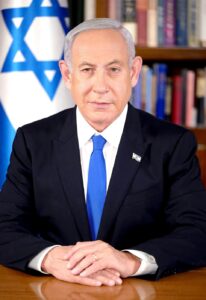
Prime Minister Benjamin Netanyahu has seized on the scandal to reinforce his long-standing claims of a “deep state” working against his administration. His allies argue that elements within Israel’s political and intelligence apparatus have systematically undermined his policies. While some see this as a diversionary tactic, others believe it may lead to further political purges and policy shifts. [14]
As investigations continue, Qatargate threatens to reshape Israeli politics, influence public trust, and redefine the country’s regional alliances. The legal and national security ramifications are vast, and the outcome of this controversy will likely have long-lasting effects on Israel’s strategic direction.
Qatar’s Alleged Influence on Israeli Media: Amplifying Negative Claims About Egypt and Hamas Mediation
One of the most intriguing allegations emerging from the Qatargate scandal is the accusation that Qatar used bribes to manipulate Israeli media narratives concerning Egypt’s role in mediating between Hamas and Israel. [15] According to investigators and various whistleblowers, Qatari officials allegedly funneled money through Netanyahu’s advisers, Yonatan Ulrich and Eli Feldstein, to spread negative portrayals of Egypt’s diplomatic efforts in Gaza. These allegations caused a furore in Egypt, with assorted MPs and journalists publicly accusing Qatar of masterminding plots aimed at destabilizing Egypt. One of the journalists accused Doha of funneling money to the local Muslim Brotherhood entities. [16] This claim, if proven true, highlights a complex and delicate web of geopolitical maneuvering, involving foreign interests seeking to shape Israeli public opinion regarding Egypt’s relationship with Hamas and the broader regional peace process.
The Allegations of Qatar’s Role in Shaping Media Narratives
The accusations suggest that Qatar sought to undermine Egypt’s role in the mediation process by portraying Egypt as ineffective or, worse, complicit in Hamas’ actions. Qatar, which has long maintained close ties with Hamas, reportedly pushed for a narrative that would cast Egypt as an obstacle to peace, casting doubt on Cairo’s role as an impartial mediator.
According to the allegations, Ulrich and Feldstein were tasked with amplifying these negative messages through media outlets, particularly by encouraging prominent Israeli journalists, activists, and think tanks to publish reports criticizing Egypt’s involvement. These efforts were allegedly designed to shift Israeli public opinion away from supporting Egyptian mediation, a goal that dovetails with Qatar’s broader interest in maintaining its influence over Hamas and preventing Egypt from fully dominating the peace process.
Key Israeli Officials and Activists Amplifying the Claims
Several high-profile Israeli figures and organizations have played a pivotal role in amplifying these negative portrayals of Egypt, whether knowingly or unknowingly. Among the key actors were prominent Israeli journalists with close ties to Netanyahu’s inner circle, who reportedly published articles questioning Egypt’s sincerity in peace negotiations. Some of these pieces leaned heavily on sources connected to Qatar, often suggesting that Egypt was engaging in behind-the-scenes dealings with Hamas that were detrimental to Israeli security.
Israeli non-governmental organizations (NGOs) aligned with left-wing or pro-peace ideologies were also reportedly involved in spreading these narratives. These organizations, while not necessarily acting under direct Qatari influence, may have unknowingly echoed Qatari-sponsored messaging, inadvertently casting doubt on Egypt’s mediation efforts.
Additionally, activist groups in Israel—many of which are aligned with the Palestinian cause—may have further amplified these claims by publishing reports on Egypt’s alleged mishandling of ceasefire agreements and its role in allowing Hamas to strengthen its position in Gaza. Many of these groups are vocal in their opposition to Egyptian involvement in Gaza, seeing Cairo’s strategy as serving its own regional security interests rather than the cause of Palestinian liberation. Israel’s Ambassador to the UN Yechiel Leiter had accused Egypt of violating its peace treaty with Israel. [17] Israel’s outgoing Chief of the General Staff of the IDF Lt. Gen. Herzi Halevi, warned about Egypt’s expanding military capabilities as a potential future security threat to Israel, [18] contributing to a narrative that Egypt is allegedly preparing for a war with Israel. The narrative resulted in a formal public warning over the military buildup at the border by Defense Minister Israel Katz. [19] The possibility of a war with Israel is also lurking in the internal Egyptian discussions, along with the growing concern about Israel’s intentions and escalating rhetoric from a hardline right-wing government. [20]
The Strategic Context: Why Qatar Would Want to Undermine Egypt

The Qatari government has long been a backer of Hamas, both financially and politically. [21] As a result, Qatar is keen to prevent any single actor from dominating the Palestinian reconciliation process. In particular, Egypt’s role as a mediator between Hamas and Israel has posed a challenge to Qatar’s influence, as Cairo is seen as a regional power that could push Hamas toward compromise with Israel—something Qatar is keen to avoid in order to maintain its own influence over the Palestinian group. [22]
Additionally, Egypt’s political alignment with Saudi Arabia and other Gulf states has created a divide between Qatar and Egypt, especially since the 2017 Saudi-led boycott of Qatar. Egypt, as a staunch supporter of the boycott, has become a target for Qatari efforts to discredit and weaken its standing within the region [23]. By influencing Israeli media to portray Egypt negatively, Qatar could undermine Egyptian legitimacy in the peace process and shift Israeli opinion toward favoring alternative mediators more aligned with Qatar’s interests, like Turkey.
Impact on Israel’s Policy and Regional Dynamics
The alleged campaign to amplify negative perceptions of Egypt and its mediation efforts could have significant ramifications for Israeli policy. If Israeli public opinion was swayed by such narratives, it could influence the Israeli government’s willingness to cooperate with Egypt in future peace negotiations. Given the importance of Egyptian mediation in past Israeli-Palestinian ceasefires, this type of influence campaign could further complicate the already fragile peace efforts in Gaza and broader Israeli-Palestinian relations.
Additionally, the underlying geopolitical dynamics are heavily influenced by Qatar’s positioning in the Middle East. Qatar has historically positioned itself as a key player in the region, fostering relationships with both Islamist groups like Hamas and Western allies. Israel’s delicate relationship with Qatar—complicated by Donald Trump’s rhetoric about alleged shared interests in combating Iran—would likely be further strained if evidence emerges linking Qatar to media manipulation within Israel. [24]
However, this also opens up a broader set of questions regarding the nature of foreign influence within Israel. While Israel has long struggled with external influence over its domestic politics, the Qatargate scandal may underscore the extent to which foreign actors can shape Israeli public opinion on critical issues such as security, diplomacy, and the future of Gaza. This also raises concerns about the power dynamics within Israel itself—whether certain factions or political players, like Netanyahu’s advisers, have allowed themselves to be co-opted by foreign interests to the detriment of national policy.
The Qatargate scandal has exposed a dangerous intersection of foreign influence and domestic policy manipulation in Israel. The allegations surrounding Ulrich, Feldstein, and their ties to Qatari efforts to amplify negative claims about Egypt’s role in the Gaza conflict are emblematic of a broader struggle for influence in the Middle East. As the legal investigations into these allegations continue to unfold, the implications for Israel’s security policy and its relations with Egypt could be profound. Ultimately, the scandal raises uncomfortable questions about how susceptible Israeli politics is to foreign meddling and how such influence could skew national priorities in dangerous directions. The involvement of Qatar in manipulating Israeli media to achieve foreign policy objectives may prove to be one of the most significant—and destabilizing—foreign interventions in Israel’s internal politics in recent years.
Qatar’s Media Campaign Against Egypt: A Mirror of its Strategy During the 2017 Gulf Crisis and its Potential Violation of the AL-Ula Agreement

Qatar’s alleged manipulation of Israeli media to undermine Egypt’s mediation efforts in Gaza mirrors its broader regional strategy, particularly its behavior during the 2017 Gulf Crisis. Just as Qatar faced regional isolation and was accused of supporting terrorist groups and destabilizing the region, the recent Qatargate scandal reveals a continued pattern of using strategic media campaigns to protect and promote its own interests at the expense of regional stability and key alliances.
Qatar’s Strategy During the 2017 Gulf Crisis: A Context for Media Manipulation
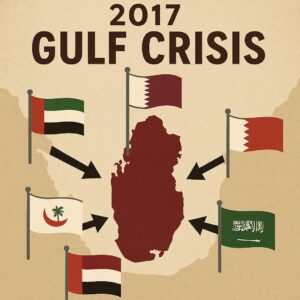
In 2017, Qatar found itself at the center of a regional crisis when Saudi Arabia, the UAE, Bahrain, and Egypt formed the Anti-Terrorism Quartet (ATQ) and imposed a blockade on Qatar. The Quartet accused Qatar of supporting terrorism, fostering ties with groups like Hamas and the Muslim Brotherhood, and destabilizing the region. In response, Qatar aggressively leveraged its media outlets, particularly Al Jazeera, to challenge the accusations and amplify narratives of resistance against the blockade. [25]
Qatar’s media campaign was not merely about self-defense; it was also a concerted effort to paint the Quartet members—particularly Saudi Arabia and Egypt—as regional powers seeking to stifle Qatar’s independence and ideological positioning. [26] Through this media campaign, Qatar sought to bolster its standing in the Arab world, positioning itself as the victim of a bullying campaign led by its regional rivals. Al Jazeera, as Qatar’s main state-backed media tool, became the mouthpiece for Qatar’s narrative, serving as a platform for counter-narratives that challenged the legitimacy of the ATQ’s demands. [27]
Qatar’s Media Manipulation in the Context of Israel and Egypt

The recent allegations against Qatar in the Qatargate scandal, specifically involving the bribing of Netanyahu’s advisers to manipulate Israeli media, follow a similar strategy of using media as a tool to shape regional politics. The goal this time, however, appears to be discrediting Egypt’s role in mediating the Gaza conflict.
By allegedly funneling money through Israeli intermediaries, Qatar sought to amplify negative portrayals of Egypt, undermining its credibility as a mediator and casting doubt on Egypt’s effectiveness in securing peace with Hamas. This media manipulation mirrors Qatar’s earlier behavior during the Gulf Crisis, when the country used media outlets to sow discord between regional players, including Egypt, which had aligned itself with the ATQ. Just as Al Jazeera became a platform for challenging Saudi Arabia and Egypt, Qatar allegedly used Israeli media to challenge Egypt’s regional leadership role, especially in its capacity as a mediator in the Palestinian conflict.
The link between the two campaigns is clear: Qatar’s use of media to counter its political rivals—whether in the context of the Gulf Crisis or the Israeli-Palestinian conflict—demonstrates a consistent strategy of leveraging the media to shape narratives that favor its geopolitical agenda. By using Israel’s media landscape to undermine Egypt’s position, Qatar is continuing its broader regional agenda of weakening its rivals and reinforcing its own position as a key player in Middle Eastern geopolitics.
The AL-Ula Agreement: A Potential Violation?

The AL-Ula Agreement, signed in January 2021, marked a pivotal moment in the post-Gulf Crisis landscape, with Saudi Arabia, the UAE, Bahrain, and Qatar agreeing to end the rift that had divided the Gulf Cooperation Council (GCC) for over three years. The agreement was hailed as a diplomatic breakthrough, restoring Qatar’s standing in the GCC and signaling a thaw in relations between Qatar and its former boycotting neighbors. [28]
However, the terms of the AL-Ula Agreement placed significant pressure on Qatar to adjust its regional behavior, particularly in terms of its media policies and support for groups deemed as destabilizing by its neighbors. Qatar was expected to comply with a broad commitment to “regional security,” which could be interpreted as an obligation to stop promoting narratives or actions that could destabilize the region, including media campaigns that target other GCC members or key regional players like Egypt. [29]
The ongoing allegations of Qatari involvement in manipulating Israeli media and undermining Egyptian mediation efforts in Gaza raise serious questions about whether Qatar’s actions violate the spirit, if not the letter, of the AL-Ula Agreement. While the agreement may not explicitly forbid Qatar from engaging in media manipulation or using external actors to influence Israeli public opinion, its commitment to “regional stability” and “non-interference” in the internal affairs of other states suggests that such a campaign would run counter to the spirit of the agreement.
The involvement of Netanyahu’s advisers, especially if it’s proven that they were paid by Qatari interests to advance a specific media narrative, could be seen as an attempt by Qatar to destabilize Egypt’s position in the Israeli-Palestinian peace process. This would certainly fall under the category of “regional destabilization,” especially when the primary purpose of such manipulation is to discredit a key player in the peace negotiations.
The Geopolitical Ramifications: Implications for Qatar’s Relations with the GCC and Beyond
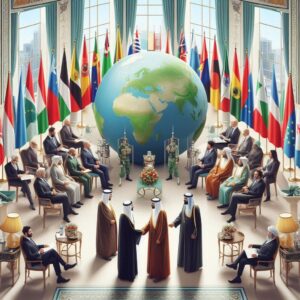
If the allegations about Qatar’s role in the Qatargate scandal are proven to be true, the consequences for Qatar could be significant. Despite the official end of the Gulf Crisis and the reintegration of Qatar into the GCC fold, the country’s actions would suggest a continued reluctance to abandon its independent foreign policy or its alliances with Islamist groups, such as Hamas. Qatar’s approach to the Israeli-Palestinian conflict, particularly its efforts to bolster Hamas’ standing at the expense of Egypt’s regional diplomacy, could alienate its neighbors in the GCC, especially Saudi Arabia and the UAE, who have grown increasingly wary of Qatar’s ties to radical Islamist groups.
Qatar’s continued involvement in such covert media campaigns could also risk undermining its efforts to rehabilitate its image in the international community, particularly in the West. The AL-Ula Agreement was, in part, a step towards restoring Qatar’s standing with the US, as well as with key European partners. However, the persistence of this alleged media manipulation campaign could raise concerns in Washington, where officials are already wary of Qatar’s relationship with Hamas and other controversial groups. [30]
Qatar’s alleged use of media manipulation to influence Israeli perceptions of Egypt’s role in the Gaza conflict mirrors its broader strategy during the 2017 Gulf Crisis. The country has consistently used media as a tool to promote its geopolitical interests and challenge regional rivals, whether it be through Al Jazeera or, more recently, through covert media influence campaigns involving Israeli media outlets. The allegations are troubling not only because they highlight Qatar’s persistence in employing such tactics but also because they may violate the spirit of the AL-Ula Agreement, which was supposed to mark a new era of cooperation and regional stability.
If the allegations are proven true, the implications for Qatar’s relations with the GCC and its international standing could be far-reaching, especially if it is seen as violating the terms of the agreement. [31] Qatar’s commitment to regional stability and non-interference could be called into question, further straining its relationships with its neighbors and tarnishing its image as a responsible actor on the world stage. In the end, Qatar’s media manipulation strategy, which has consistently sought to undermine its regional rivals, may ultimately backfire, jeopardizing its diplomatic progress and intensifying tensions in an already volatile region.
The seemingly coordinated anti-Egypt accusations from various sources, including the Federation for the Defense of Democracies (FDD), Jonathan Conricus (a spokesperson for the Israel Defense Forces), and several Egyptian dissidents active in Israel and the U.S., raise significant questions about the role of media influence, political alliances, and regional dynamics. When placed in the context of Qatargate, it becomes clear that these narratives could have been exacerbated or manipulated by Qatar’s broader media campaigns, particularly its focus on undermining Egypt’s role in mediating peace efforts and portraying the country as complicit with Hamas. Understanding this coordination and its potential consequences requires an in-depth analysis of these players and their actions.
The Federation for the Defense of Democracies (FDD)

The FDD is a prominent think tank that has often criticized Egypt’s relationships with terrorist organizations, particularly Hamas, due to Egypt’s historical and complicated involvement in the Gaza Strip. The organization’s criticism has often been aligned with regional concerns regarding Islamist movements and their implications for global terrorism. While the FDD’s criticisms of Egypt are not new, the accusations, when intensified through coordinated media campaigns, can have an outsized influence on Western policy, particularly in the United States and Europe.
The FDD’s stance on Egypt is often critical of the government’s security measures and alliances, especially when it comes to Hamas. The recent surge in criticism of Egypt’s role could be amplified as part of a broader effort to align U.S. policy with the regional concerns voiced by other Middle Eastern actors. [32] Qatar, a known supporter of Hamas, would have an incentive to fuel such criticism, particularly if it can convince international actors that Egypt’s involvement in Gaza is a security threat rather than a stabilizing factor.
Jonathan Conricus and Israeli Influence

Jonathan Conricus, a former spokesperson for the Israeli Defense Forces, who has joined the FDD as a senior fellow, but also maintains an independent presence on social media and via a blog, has consistently used public platforms to critique Egypt’s role in Gaza, often highlighting security concerns surrounding Egypt’s border management and its interactions with Hamas. [33] Most recently, he drew controversy after calling Egypt “a failing state”. [34] While Israel and Egypt have a cooperative relationship on security matters, particularly in relation to Gaza, there are longstanding tensions due to Egypt’s role in mediating peace and its nuanced relationship with Hamas, a group that Israel considers a terrorist organization.
In this context, Conricus’s statements may reflect broader Israeli concerns about Egypt’s role in Gaza, but they also align with Qatar’s regional strategy. Qatar has long positioned itself as a supporter of Hamas, and amplifying Egypt’s supposed failure in curbing Hamas’s influence would serve to undermine Egyptian credibility as a security partner in the region. In this way, Conricus’s statements, when linked to broader media campaigns, may not only reflect Israeli policy but also fit into a larger regional dynamic orchestrated by actors like Qatar.
Egyptian Dissidents in Israel and the U.S.

Several Egyptian dissidents, who are active in both Israel and the United States, have been vocal critics of the Egyptian government, particularly regarding its approach to Hamas and its perceived leniency toward the group. [35] These dissidents often focus on Egypt’s failure to fully clamp down on Hamas’s operations from within the Gaza Strip, despite Egypt’s own struggles with the Muslim Brotherhood and Islamist movements. They also encourage US and Israel to focus pressure on Egypt. [36] In the U.S. and Israel, these voices find fertile ground, particularly as Western governments grow increasingly concerned about the rise of radical Islamism and terrorism. The persistence of these narratives raises questions whether individuals with a personal ax to grind against Cairo are channeling their resentment and frustrations through the more acceptable lens of alleged concern for Israel’s security.
In the context of Qatargate, these dissidents’ accusations could be seen as a potential outlet for Qatari influence, as Qatar has historically maintained ties with such movements. Qatar’s willingness to support media campaigns that bolster Hamas’s interests and discredit Egypt’s security role could benefit from these voices, particularly in amplifying a narrative that Egypt is too weak or unwilling to effectively combat Hamas. [37] By channeling criticism through dissident voices, Qatar can circumvent direct accusations and present itself as a neutral party while undermining Egypt’s legitimacy. In the instance of the Gaza tunnel narrative, it was immediately debunked by the Israeli government [38}
The Role of Qatari Media Campaigns

Qatar has long been accused of using its media outlets, such as Al Jazeera, to promote narratives that serve its geopolitical agenda. During the Gulf Crisis in 2017, Qatar’s media campaigns were central in countering the accusations of terrorism support and promoting counter-narratives to its rivals in the Gulf. [39] Qatar’s media infrastructure has similarly been deployed in the context of Gaza, where it has provided substantial support to Hamas, a group that Egypt and Israel both consider a terrorist organization. [40]
The alleged media campaigns targeting Egypt’s role in Gaza—especially accusations of Egypt’s facilitation or tolerance of Hamas activities—fit into this broader pattern. If Qatar has indeed financed Israeli media or paid intermediaries to amplify these narratives, it would represent a continuation of its efforts to shift regional perceptions. Qatar’s goal would be to undermine Egypt’s credibility as a partner in counterterrorism efforts and as a key player in peace negotiations, thereby strengthening Hamas’s position and weakening Egypt’s leverage.
The impact of these campaigns is significant. By aligning with various dissidents, critics of Egypt’s policies, and regional media outlets, Qatar can successfully plant doubts about Egypt’s true role in Gaza. This, in turn, influences international public opinion, particularly in the U.S. and Europe, where there are already existing concerns about Egypt’s commitment to counterterrorism efforts and its relationship with Islamist groups. [41] Qatar’s media strategy is designed to capitalize on these concerns, pushing the narrative that Egypt is not as committed to regional security as it claims to be.
Impact on Public and NGO Perception of Egypt

The ramifications of Qatar’s alleged media influence on Egypt’s security and its role in Gaza can be seen in the shifting public and NGO perceptions. Many international NGOs, especially those focused on human rights and Middle East peace, are likely to take Egypt’s criticism and portrayal of its mediating role in Gaza seriously. The perception that Egypt is either complicit in Hamas’s activities or ineffective in curbing them could damage Egypt’s international standing and complicate its diplomatic efforts, especially in the West. To be clear, there is no evidence than any one of the actors who intentionally or unintentionally amplified these campaigns was fully aware of the role of others or was intentionally coordinating on a Qatari plot. However, from the point of information warfare strategy, the simultaneous pursuit of a choir of credible voices in foreign policy would serve the purpose of advancing Qatar’s interests in a systemic and effective way.
This narrative would also serve to embolden critics within Egypt and in the broader Arab world, especially those who feel that Egypt has not sufficiently dealt with Hamas or has allowed Gaza to become a breeding ground for terrorism. Qatar’s ability to promote this narrative through media and dissident voices allows it to manipulate global perceptions of Egypt’s role without directly confronting the Egyptian government or facing backlash for its own support of Hamas.
The coordinated anti-Egypt accusations from the Federation for the Defense of Democracies, Jonathan Conricus, and Egyptian dissidents, when viewed through the lens of Qatargate, reveal a larger geopolitical struggle. A campaign can be coordinated without any of the actors being aware of taking part in it. Strategically planting disinformation or distorted information that corresponds to the concerns and patterns of the parties most likely to pick up on these seeds is sufficient. Qatar’s use of media to undermine Egypt’s credibility in the Gaza conflict mirrors the strategies it employed during the Gulf Crisis to challenge its regional rivals. By influencing media outlets and amplifying voices critical of Egypt, Qatar appears to be pushing a narrative that weakens Egypt’s role as a security partner in Gaza and in the broader Middle East.
These media campaigns are not only damaging to Egypt’s regional position but also have serious implications for international public opinion, particularly in the U.S. and Europe. As Qatar continues to use its media networks to advance its geopolitical agenda, the growing influence of these narratives could shift perceptions of Egypt’s role in the region, further isolating it from potential allies and complicating its diplomatic efforts to mediate peace in Gaza. If Qatar’s involvement is proven, it would further demonstrate the lengths to which the Gulf nation is willing to go to influence perceptions and reshape the regional balance of power, particularly in the context of its ties to Hamas and its broader rivalry with Egypt.
Hussein Aboubakr Mansour and Dalia Ziada are two prominent Egyptian dissidents who have been vocal critics of the Egyptian government, particularly in relation to its policies concerning Hamas and its broader regional security posture. Their public commentary has gained attention both within Egypt and internationally, especially among organizations and media outlets critical of the current Egyptian administration. When analyzed in the context of the Qatargate scandal and the broader geopolitical dynamics involving Qatar, it becomes clear that their statements, some of which have been unsubstantiated or aligned with narratives that Qatar has historically sought to promote, could be reflective of larger regional power plays and influence campaigns.
Hussein Aboubakr Mansour’s Critique of Egypt’s Role in Gaza
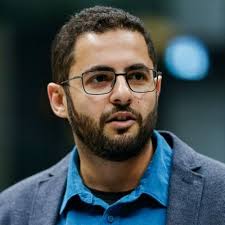
Hussein Aboubakr Mansour, a vocal critic of the Egyptian government, has been described as having made multiple verbal claims about Egypt’s purported complicity with Hamas, particularly focusing on its handling of the Gaza border and its policy toward the Palestinian group. Mansour, who has long been an outspoken critic of the Egyptian government under President Sissi, has allegedly frequently accused the government of turning a blind eye to Hamas’s operations, arguing that Egypt’s failure to adequately control its border with Gaza allows Hamas to freely operate and further destabilize the region. Moreover, he has accused Sissi of harboring religious fundamentalism comparable to Muslim Brotherhood ideology in level of threat and extremism. [42] . Most of his written critiques have been couched in the language focusing on anti-Israel cultural norms in Egypt, or as a concern about specific policies such as the Gaza plan. Broadly speaking, Mansour has stayed away from direct written accusations that the state institutions deliberately facilitate Hamas. However, Mansour’s commentary highlights his belief that Egypt’s policies toward Hamas are driven by internal power dynamics and regional ambitions, often at the expense of genuine efforts to address the underlying issues in Gaza.
Many of Mansour’s claims echo those made by other critics of Egypt, but there is little substantiation for many of these assertions, which are often generalized and based on anecdotal evidence or circumstantial data. For example, his insinuated criticisms of Egypt’s policy of allowing humanitarian aid into Gaza and his allegations that the government secretly aids Hamas, described by several sources who were engaged in verbal conversations with him, are not supported by verifiable evidence. Instead, these claims, if accurate, would align with narratives frequently promoted by regional actors like Qatar, which has long supported Hamas and sought to discredit Egypt’s role as a mediator in the Gaza conflict. Mansour’s comments, while not directly tied to Qatari influence, mirror the kind of accusations that Qatar has sought to advance in its media campaigns, using its networks to amplify criticisms of Egypt’s actions or inactions in Gaza. Ironically, in public Mansour is a fierce critic of Qatar’s regional role, including its participation in the mediation between Israel and Hamas. Interestingly enough, most of Mansour’s written oeuvre carefully avoids direct discussion of Egypt’s role in the current conflict.
Instead, most of his remarks on that subject are found in informal commentary or through personal conversations. But precisely because most of his work combines credibility on other subjects and a highly personal narrative of his purported experience growing up in Egypt, his informal off-the-record insinuations could carry a great deal of weight and impact behind the scenes. In other words, there is a vast difference between content that Mansour can be tied to in public affirmatively and the hearsay related to his private comments in Israeli policy and influencer circles.
This duality positions Mansour to avoid scrutiny of his views on the Egyptian state policies, for the most part, while being able to use personal influence to affect perceptions and even policies on Egypt in Israeli and pro-Israel circles through unrecorded conversations. Given that he has never recanted his critical Times of Israel article on Sissi, one can only surmise that his position towards Egypt’s foreign policy on Israel and Gaza is overwhelmingly negative. His unwillingness to commit the worst of his concerns to writing is reason enough for the policymakers to listen to any oral appeals, information, and policy recommendations related to Egypt from Mansour with a great deal of caution.
In the broader context of Qatargate, Mansour’s commentary can be viewed as fitting into a larger pattern of delegitimizing Egypt’s role in Gaza, even if his own views may be more based in ideological opposition to the Egyptian government. Worth noting is that most of Mansour’s work has very little to do with Egypt per se and rather focuses on anti-Zionism on US campuses, the failure of the allegedly pro-Palestinian movements, and other Israel-focused issues. To the extent he writes about Egypt, the content is focused on the “cold peace” or a generic history of human rights violations in Egyptian prisons.
The fact that Mansour is so cautious in discussing Egypt’s government in writing, while being allegedly far more direct and critical in personal conversations indicates that Mansour prefers that his readership surmises a seeming support for these Egypt-skeptical narratives, without fully committing to being on the record with these assertions. The similarity between Mansour’s rhetoric and the messages promoted by Qatari-aligned media outlets suggests that, whether intentional or not, both his public and private critiques have served to amplify the same narrative that Qatar is pushing, further complicating Egypt’s diplomatic position. Much can be surmises from the fact that while critical of Egypt’s “alternative” Gaza plan, Mansour offers little by way of constructive policy suggestions to Cairo over its general mediation role or internal security problems other than a push for reforming prisons and embracing a warmer people-to-people peace with Israelis (hardly a controversial or new position).
Despite growing up in Egypt, Mansour steers away from being framed as an Egypt expert or commentator, unlike many of the other Egyptian dissidents, focusing almost exclusively on adjacent subjects. And he uses claims of his alleged suffering in the hands of the Egyptian military intelligence as a credibility gesture to establish himself as a “positive” Egyptian-origin voice in the Israeli and pro-Israel foreign policy establishment. Without fully confronting Cairo’s official positions, Mansour has successfully built an image of the one Egyptian wiling to fully engage with Israel, and providing a welcome counternarrative to the endless stream of anti-Israel rhetoric in Egyptian media. His voice provides an indirect disincentive to engage more directly with Egyptian officials and to confront difficulties head on, instead relying on the “safety” of the “friend” from Egypt who does not represent the official policies.
Dalia Ziada’s Accusations and Their Alignment with Qatar’s Media Strategy

Dalia Ziada, another well-known Egyptian dissident, has similarly criticized Egypt’s handling of Gaza and its relations with Hamas, often accusing the government of turning a blind eye to Hamas’s activities. [43] Ziada’s comments have frequently appeared in the international media, gaining traction among pro-democracy activists and groups critical of Egypt’s military-backed leadership. She has specifically raised concerns about Egypt’s alleged support for Hamas’s operations, furthering the notion that Egypt’s government is complicit in facilitating the group’s influence in Gaza.
Ziada’s rhetoric, like Mansour’s, shares striking similarities with the narratives advanced by Qatar’s state-sponsored media outlets, such as Al Jazeera, which has long positioned itself as a vocal critic of Egypt’s security policies and its role in Gaza. Qatar’s media efforts, particularly during the 2017 Gulf Crisis, centered on discrediting Egypt and undermining its regional security efforts, portraying it as ineffective in dealing with Hamas. Ziada’s criticisms align with these broader narratives, as her claims about Egypt’s complicity in Hamas’s activities echo Qatar’s broader geopolitical objectives. [44] She, too has raised the prospects of a potential Egypt-Israel war, disseminating public paranoia over this concern. [45]
Ziada has also been associated with several Western-based NGOs and think tanks that focus on human rights in the Middle East, organizations that have been criticized for amplifying narratives that challenge the legitimacy of Egypt’s government. While Ziada’s claims might come from a genuine ideological opposition to the Egyptian government, the broader regional context suggests that her statements could be inadvertently contributing to a larger campaign to delegitimize Egypt’s role in Gaza and within the Middle East at large. Qatar has a vested interest in promoting these narratives, as it seeks to weaken Egypt’s influence and advance its own geopolitical interests in the region, particularly in support of Hamas and other Islamist movements.
Unsubstantiated Claims and Their Role in the Broader Qatari Influence Campaign

Both Mansour and Ziada have made a number of claims about Egypt that are either unsubstantiated or only loosely connected to available evidence. In the context of Qatargate, these claims—while not necessarily fabricated—mirror the types of accusations that have been advanced in Qatari media campaigns aimed at undermining Egypt’s credibility. By accusing or insinuating that Egypt of being complicit in Hamas’s activities or failing to adequately address Hamas’s influence in Gaza, Mansour and Ziada amplify a narrative that benefits Qatar, which has historically supported Hamas and sought to position itself as an alternative power broker in the region.
The unsubstantiated nature of many of these claims is significant. Both Mansour and Ziada have criticized Egypt without offering concrete proof of their allegations, and this lack of evidence makes it difficult to assess the veracity of their statements. However, the repetition of these claims in the media, particularly in Western outlets that are critical of Egypt’s policies, helps create an environment in which Egypt’s role in Gaza is questioned and its legitimacy as a regional security partner is undermined. Qatar, which has long backed Hamas, benefits from this environment by weakening Egypt’s standing and bolstering the credibility of groups that oppose Egypt’s influence in Gaza.
Concerns About Their Claims and Alleged Lack of Substantiation

Both Mansour and Ziada’s claims or indirect insinuations about Egypt’s policies towards Gaza and Hamas often lack substantiation. For instance, both have repeatedly alleged, whether in personal comments or in writing, that Egypt is complicit in Hamas’s operations without providing any concrete evidence or verifiable data to support their accusations. This lack of solid evidence undermines the credibility of their critiques, especially when they make sweeping claims about the Egyptian government’s alleged complicity in Hamas’s actions.
Moreover, the generalization of their statements can be problematic. For example, accusing Egypt of being “complicit” in Hamas’s operations without specifying the nature or scale of this alleged complicity leaves room for misinterpretation. Such generalized claims can be easily amplified by media outlets and activist groups with an agenda to discredit Egypt, but they also lack the nuance necessary to understand the complexities of the Egyptian government’s stance on Gaza and Hamas. While it is true that Egypt has sometimes acted in a way that some may see as favoring Hamas—such as allowing humanitarian aid to pass through the Rafah border—this is far from an endorsement of Hamas’s violent agenda. Egypt has also played a key role in mediating ceasefire agreements between Hamas and Israel, which complicates the narrative of total complicity that Mansour and Ziada seem to suggest.
Additionally, the fact that both Mansour and Ziada have strong ideological opposition to the Egyptian government raises further concerns about the objectivity of their critiques. As activists who have long either long opposed the Egyptian government or have turned against it more recently, their statements could be seen as biased or motivated by personal opposition rather than a fair and balanced assessment of Egypt’s policies. This ideological opposition complicates their ability to offer a dispassionate analysis of Egypt’s relationship with Hamas or its handling of the Gaza conflict.
Media Amplification and Regional Dynamics

The role of media in amplifying Mansour and Ziada’s comments cannot be understated. Qatar’s media outlets, particularly Al Jazeera but also Western media, have been instrumental in promoting narratives that align with the agendas of political actors and dissidents critical of Egypt’s policies. By amplifying Mansour and Ziada’s criticisms of Egypt, these media outlets can shape public perception both within the Arab world and in the West. The amplification of such accusations serves to further Qatar’s goal of positioning itself as a key player in the region, often at the expense of its rivals, including Egypt.
The regional dynamics in which these comments are made are also significant. Qatar has long been in a geopolitical rivalry with Egypt, particularly since the 2017 Gulf Crisis, when Egypt, along with Saudi Arabia and the UAE, severed diplomatic ties with Qatar. Qatar’s support for Hamas and its attempts to undermine Egypt’s regional security role are part of a larger strategy to challenge Egypt’s influence in the Middle East. By supporting media campaigns that echo the criticisms made by figures like Mansour and Ziada, Qatar can advance its own agenda while simultaneously weakening Egypt’s position as a mediator in the Gaza conflict.
Hussein Aboubakr Mansour and Dalia Ziada’s private or public commentary about Egypt’s role in Gaza, particularly regarding its relationship with Hamas, fits into a broader geopolitical context that involves Qatar’s efforts to undermine Egypt’s regional influence. Their criticisms, though not necessarily part of a coordinated campaign, align with narratives that have historically been amplified by Qatari-aligned media outlets. By accusing Egypt of complicity with Hamas or of being ineffective in its role as a mediator in Gaza, Mansour and Ziada inadvertently contribute to a broader media strategy that seeks to weaken Egypt’s credibility and challenge its legitimacy as a security partner in the region. Therefore, even if their intentions are well-meaning, the fact that these comments feed into a broader campaign still makes their impact problematic as it strengthens the hand of a hostile actor.
The unsubstantiated nature of their claims and insinuations and the broader media amplification of these accusations suggest that Qatar could be playing a role in shaping the narrative surrounding Egypt’s role in Gaza. Whether through direct influence or through the amplification of voices critical of Egypt, Qatar’s involvement in these campaigns is part of a larger regional struggle for influence, particularly in relation to Hamas and Egypt’s role in the Middle East. As Qatar continues to position itself as a key player in Gaza and the broader region, the voices of critics like Mansour and Ziada serve as useful tools in its ongoing efforts to challenge Egypt’s influence and weaken its regional standing, even if they are completely unaware of how their concerns could be redirected.
Suspicions About the Verifiability of Their Backgrounds

One of the most contentious aspects of Mansour and Ziada’s profiles is the difficulty in fully verifying their backgrounds and the exact nature of their claims. Despite their high profiles within certain Western and human rights circles, the details of their personal histories, especially their alleged suffering and their roles in Egypt’s political opposition or alleged persecution by the government, remain opaque.
Mansour, for instance, has been described as a former activist and writer, but little is known about his actual experiences with Egyptian authorities beyond his claims of being surveilled and persecuted. He has mentioned instances of detention, but the specifics of these events have been hard to independently verify, including by The Washington Outsider Center for Information Warfare. It is unclear whether he faced the same degree of hardship as other political prisoners in Egypt, secular political figures, or whether his experiences are somewhat less severe than portrayed. His narrative of suffering is based largely on his personal testimony, but the lack of corroborating evidence raises questions about the extent of his victimization.
Given his ideological stance as a vocal opponent of the Egyptian government, it is also possible that his portrayal of events has been colored by his broader political goals. Moreover, the independent inquiry into his background by TWOCIW, failed to establish his identity, much less the reported record of public activism or arrests or detention. It is possible that he has assumed a different name upon fleeing to the name, and has benefited from the public trust into his narratives. The fact that various institutions in the US, Israel, UAE, and other countries have taken his story at face value without corroborating his claims with due diligence raises red flags about counterintelligence vulnerabilities in these circles.
Similarly, Ziada’s background has been questioned by some in Egypt and beyond. While she is now recognized as an outspoken critic of the Egyptian government, there are gaps in her personal history that raise doubts about her claims of persecution. Ziada has described instances where she was allegedly targeted by the Egyptian authorities, but her narrative remains vague and lacks sufficient documentation. Moreover, while shortly after her arrival in the US she claimed to have fled persecution by Hamas supporters, but later her narrative changed to insinuate that the government was responsible for her exile. The fact that she has been able to travel freely and engage in international advocacy without apparent legal repercussions complicates the portrayal of her as a persecuted dissident. Furthermore, her affiliations with international organizations that have an interest in challenging the Egyptian regime’s policies might influence how her claims are received, and whether they are viewed with skepticism or as credible testimonies of oppression. Her latest claims indicate that some members of the Egyptian parliament threatened or suggested that her citizenship be taken away, but the source of that information and the seriousness of that thread is in doubt. [46]
The lack of verifiable sources to corroborate their accounts, combined with the lack of a clear, independent investigative body to look into their claims, leaves room for doubt about the true nature of their alleged suffering. Without a thorough third-party investigation into their cases, it is difficult to assess the validity of their claims or determine the full scope of their interactions with Egyptian authorities. This gap in verifiability leaves their personal narratives open to manipulation, either by themselves or by those who seek to use their stories for political purposes.
Political Implications of Unverified Claims

The unverified nature of Mansour and Ziada’s personal stories of suffering also complicates their role in broader political debates. By presenting themselves as victims of an oppressive regime, they are aligning with certain geopolitical narratives that serve to further the interests of external actors who are critical of Egypt’s political leadership. Qatar, Turkey, and various Western NGOs, among others, have used narratives of oppression and persecution to cast the Egyptian government as a regional pariah. In this context, Mansour and Ziada’s stories—though they may contain elements of truth—may also serve as tools to amplify these international criticisms.
The political nature of their claims raises the question of whether their suffering is being instrumentalized for wider geopolitical goals. Given that both individuals are prominent figures in the global human rights movement, their narratives can be leveraged to shape public perception and influence political discourse about Egypt. Their personal testimonies are part of a larger political strategy, which aims to isolate Egypt diplomatically and draw attention to its human rights record. Whether or not this is done with their direct involvement or whether they are being used as pawns in a wider game is a difficult question to answer, but it is one that must be considered when evaluating their claims.
Moreover, their backgrounds and personal histories must be analyzed within the larger context of the Egyptian opposition. Many dissidents in Egypt face real persecution, including imprisonment and harassment. However, Mansour and Ziada’s stories, when compared with those of other political prisoners, seem somewhat more selective and less verifiable. This raises the question of whether their experiences are truly representative of the wider opposition movement, or if they are exceptional cases that have been elevated for political reasons.
Claims about Egypt’s support for Hamas

Mansour and Ziada have suggested or implied indirectly that Egypt has had a tacit or even active role in supporting Hamas due to corruption, passivity of the authorities, convenience, ideological convergence of some portions of the government, or political aims of benefiting from both sides. These claims and insinuations focus on Egypt’s allegedly covert or overt assistance to Hamas, portraying Egypt as a major enabler of Hamas’s activities, particularly in terms of cross-border smuggling of weapons and militants, and lately, alleged release of Hamas prisoners to roam the streets of Cairo. However, such claims often oversimplify the complex relationship between Egypt and Hamas, ignoring the nuances of Egypt’s role as a mediator in Palestinian politics and its strategic need to balance relations with both Hamas (in Gaza) and the Palestinian Authority (in the West Bank). Egypt has consistently engaged in efforts to broker ceasefires and peace talks between Hamas and Israel, highlighting that the Egyptian government’s relationship with Hamas is much more calculated and multifaceted than what is often portrayed.
Misrepresentation of Egypt’s stance on Israel
Both Mansour and Ziada have at times suggested that Egypt is directly or indirectly complicit in activities that undermine Israel’s security, using Hamas as a proxy. For example, their rhetoric around the alleged threat posed by Hamas to Israel, with Egypt’s alleged silent endorsement or active facilitation, has been portrayed in a way that aligns more with the interests of Qatari or Turkish-backed narratives than with a realistic understanding of Egypt’s national security priorities. Mansour has written that Egyptian prisons generated Hamas supporters, ISIS, and other extremists and terrorists, which Cairo has done nothing to curb. [47] The claim that Egypt’s policies towards Gaza and Hamas consistently endanger Israel ignores Egypt’s long-standing peace treaty with Israel and its own security concerns regarding Gaza’s border, where Hamas has engaged in acts of violence against Egypt in the past. Egypt has often clamped down on Hamas’s activities in Sinai, and its government is deeply invested in preventing the rise of Islamist militant groups along its borders.
Questionable assertions about Egypt’s supposed ‘Islamist agenda’
Mansour and Ziada have suggested that Egypt’s alleged support for Hamas indicates an Islamist agenda that undermines Egypt’s peace with Israel. This claim implies that Egypt, especially under Sisi, might be sympathetic to radical Islamic groups despite the president’s actions in firmly curbing Islamist influence within Egypt. That claim is underscored by Mansour’s earlir post that claims that Sissi shares fundamentalist Islamic views. Dalia Ziada has in essence renounced her support for Sissi, accusing him of weakness and bending to the demands of pro-Hamas trends inside Egypt. [48] This narrative fails to recognize Egypt’s security challenges, particularly in Sinai, where Islamic State-affiliated groups are active, and the clear divergence between Egypt’s state policies and the Islamist ideologies of groups like Hamas.
Mansour and Ziada’s framing of the Egyptian government as aligning with Hamas based on some ideological kinship or unwillingness to confront ideological challenges ignores the practical security realities Egypt faces, where its concern about militants, their penetration into and agitation inside Egypt, and the flow of weapons through Gaza is a direct threat to its own stability, and ultimately, its relationship with Israel.
The exaggerated threat of Hamas as an “Iranian proxy”
Mansour and Ziada, echoing broader regional criticisms, have implied that Hamas is essentially a proxy of Iran, with Egypt playing a role in facilitating this relationship, particularly through the Gaza tunnels. Mansour was more circumspect, criticizing Egypt for not having a border security plan; Ziada appeared to favor the version that placed blame on Egypt for the allegedly deliberate decision not to destroy Hamas tunnels (without evidence). [49] However, this claim overlooks the reality that Egypt has often been opposed to Iran’s increasing influence in the region, including in Gaza. While Hamas has occasionally taken support from Iran, Egypt has historically been wary of any such alliances and has tried to limit Iran’s influence in Palestinian politics. Moreover, Egypt’s military and intelligence operations against Hamas in Sinai, particularly in the crackdown on militant groups, are often ignored in favor of a more one-sided narrative about Egypt being complicit in Iranian-sponsored activities. Mansour went a step further: he fed into the narrative supporting Donald Trump’s controversial proposal to resettle Gazans in Egypt and Jordan, claiming that these populations could be easily integrated into these countries. [50]
Given Mansour’s familiarity with the security climate and social attitudes in Egypt, he should know that there is both a strong opposition to such a population transfer and an unwillingness to integrate existing refugees into the general population. Egyptians and Jordanians are strongly opposed to additional mass migrations from Gaza, for both economic and security reasons. The transfer of such mass populations would threaten the fragile security fabric of these societies, endanger the state infrastructure, and most likely lead to violent clashes with the locals, negating any humanitarian efforts behind such a push.
Moreover, far from resolving Israel’s security dilemma, it would merely create extremist enclaves in Egypt and Jordan overlooking two of Israel’s borders. The fact that Mansour, knowing these concerns, is using his reputation and credibility as an Egyptian ex-patriate, to advance this policy in the conservative pro-Israel circles is the strongest indication yet, that far from being merely naïve, he is deliberately exploiting uninformed but popular views in these circles to gain wider acceptance. A worse case scenario is if he is advancing these self-defeating narratives to contribute to the ongoing frictions between Israel and its neighbors.
Simplification of the Egyptian role in Gaza’s blockade
Mansour and Ziada have also made comments about Egypt’s involvement in Gaza’s blockade, which have played into extremist rhetoric that Egypt’s policies of closing border crossings to Gaza are part of an Israeli-led conspiracy to collectively punish Palestinians. Mansour, criticizing Egypt’s Gaza plan portrayed the Egyptian government as incompetent Ziada went a step further, indicating that Egypt has failed Gazans by not taking them in or otherwise sheltering them at times of war. While there have been select instances of individual corruption where vetted Gazans could only enter Egypt after paying substantial financial offerings, overall, Ziada knows as well as Mansour does, that bringing in masses of unvetted Gaza refugees, even temporarily, would have been an unjustifiable economic and security burden for Egypt. [51] While Egypt does indeed enforce restrictions on the movement of people and goods through Rafah, this is largely driven by security concerns regarding militant infiltration into Sinai, rather than as part of some malignant conspiracy to oppress Gazans. Egypt has also periodically opened the Rafah crossing to allow humanitarian aid into Gaza and has been involved in facilitating ceasefires between Hamas and Israel.
The claims made by Hussein Aboubakr Mansour and Dalia Ziada about their suffering under the Egyptian government, as well as the broader implications of their backgrounds, should be carefully scrutinized. While it is entirely possible that they have faced some degree of persecution or hardship, the lack of verifiable evidence for their claims casts doubt on the accuracy and full extent of their suffering. Their stories fit neatly into narratives that have been promoted by international actors critical of Egypt, which raises questions about their objectivity and the political purposes their stories may serve.
The absence of independent verification of their claims makes it difficult to assess the authenticity of their personal experiences. Their alignment with specific geopolitical interests also complicates their role as dissidents and victims, as their narratives could be used to further agendas beyond their own individual struggles. Ultimately, while Mansour and Ziada may have faced hardships, the full truth of their claims remains unclear, and their personal stories should be examined within a broader context of Egyptian political dissidence and regional geopolitical dynamics. Moreover, the broader issue has significant geopolitical and diplomatic repercussions, such as the role of minor agents of influence or inadvertent contributors to Qatar’s agent may have an outsized impact and cause damage that could be hard to measure or mitigate. These cases are not unique. They fit in within the overall pattern of pro-Israel and conservative leaning audiences embracing dissident Muslim voices as a counterpoint to mainstream narratives from the Muslim-majority media or political movements.
The pattern of pro-Israel organizations relying on alleged dissidents from the Muslim world to provide commentary that aligns with their political and ideological objectives raises significant questions about the nature of information warfare, the role of media narratives, and the complexity of coalitions in the modern political and geopolitical landscape. By selectively amplifying the voices of Muslim dissidents who express views favorable to Israeli or conservative Western interests, pro-Israel organizations have become active participants in crafting a narrative that often reflects a skewed or oversimplified understanding of regional dynamics, but also serves as a tool for shaping public opinion.
Dissidents as Tools of Narrative Shaping

Pro-Israel organizations, whether based in the United States, Europe, or elsewhere, have often relied on individuals who claim to represent oppressed or marginalized voices within Muslim-majority countries to promote narratives that support Israel’s security and political objectives. These individuals—many of whom are activists, journalists, or former officials—claim to speak on behalf of their nations’ oppressed populations or to provide an insider perspective on issues related to Israel and the Israeli-Palestinian conflict. However, these individuals frequently present highly critical or dissenting views that, when amplified by pro-Israel outlets, appear to justify or bolster a particular political stance. Moreover, unless their high-ranking defectors from government agencies or influential leaders of mass movements, their reach and perspective is limited. Indeed, the Israeli government, and pro-Israel and conservative organization may be doing themselves a disfavor by relying on such individuals in formulating policies related to Egypt or other countries.
First, basing policies on minority or even subminority perspectives risks alienating the majority of the popular opinion in those countries. Second, such individuals, unless they are leaders of serious opposition movements, have no ability to influence policies in Egypt or other countries of origin. It is far more useful to engage directly with the governments and to affect change through dialogue. Third, Egyptian or other government have less incentive to engage with institutions that rely on narratives on dissidents who have personal grievances with those governments. These dissidents, unless they are high level intelligence defectors, have no leverage to push their former governments on any substantive issue; far from acting as catalysts of change, they are more likely to undermine genuine efforts to engage in frank discussions on security or human rights concerns. On the other hand, by amplifying their presence and by relying almost exclusively on their narratives, these organizations frequently fail to develop comprehensive strategies to engage with the broader populations and governments, and on the other hand, push away officials who see no reason to interact with organizations that are not serious about high level diplomatic engagement.
The Appeal to Conservative and Pro-Israel Audiences
The core appeal of these dissidents to pro-Israel organizations lies in their willingness to openly criticize radical Islamist movements, such as Hamas or the Muslim Brotherhood, and in their condemnation of violent extremism. These figures, having often lived through political or religious persecution within their own countries, offer an authentic-sounding voice that condemns extremism in a way that resonates with both Western conservatives and pro-Israel groups. In this context, these dissidents often frame their opposition to radical Islam as aligned with the West’s fight against terrorism, presenting Israel as an ally in this broader struggle.
By amplifying the voices of these dissidents, pro-Israel organizations seek to reinforce the narrative that Israel is not simply a regional actor but a crucial frontline state in the fight against global jihadism. These narratives also serve to justify Israel’s security measures, military actions, and settlement policies in the context of combating terror, and they align with conservative geopolitical priorities that emphasize counterterrorism and defense of liberal democratic values. However, these popular narratives lie in stark contrast to Israel’s and US official policies. Conservative and pro-Israel organizations in the US rarely focus on the broad regional impact of the Muslim Brotherhood and jihadist organization except as it concerns Israel, the US, or the West. Israel, too, has failed to utilize opportunities to counter Muslim Brotherhood jointly with its neighboring governments, instead at one point sitting a Muslim Brotherhood affiliate in its own government. The mixed messaging when it comes to ideological warfare and confronting joint threats generates distrust and feeds into conspiratorial mindset common in the Middle East.
Manipulation of the Victimhood Narrative

Dissidents from the Muslim world, especially those who have fled oppressive regimes, often provide compelling stories of persecution and oppression that garner significant media attention. These narratives can be emotionally charged, offering personal testimony of the brutality of authoritarian governments, Islamist extremism, and the lack of personal freedoms in certain countries.
Pro-Israel organizations leverage these narratives to underscore the perceived moral superiority of Israel as a democratic state in a region marked by authoritarianism and religious extremism. The portrayal of Israel as a beacon of democracy—especially in comparison to the Islamist regimes in countries like Iran or Syria, or even the nominally democratic states in Egypt or Turkey—reinforces a simplistic dichotomy of good vs. evil.
Furthermore, victimhood narratives from Muslim dissidents tend to de-legitimize opposing views, especially those coming from Palestinian representatives or Arab countries that criticize Israel. These narratives implicitly present the Israeli-Palestinian conflict as a binary issue: those who oppose Israel are equated with extremism, while those who support Israel are framed as rational voices speaking out against an otherwise irrational threat. This tactic helps to silence dissent or reduce the complexity of the conflict into digestible, ideologically aligned soundbites.
Fostering a Selective and Monolithic View of Islam and the Middle East
While these Muslim dissidents may offer important criticism of specific regimes or Islamist movements, the reliance on their voices by pro-Israel organizations can create a distorted or monolithic portrayal of Islam and the Middle East as a whole. By elevating those who criticize Islamist ideologies or call for religious reform, pro-Israel groups may inadvertently contribute to broadbrush stereotypes of Muslims as inherently radical or dangerous. These polarizing narratives risk alienating entire Muslim populations, reinforcing divisive rhetoric, and undermining opportunities for genuine dialogue between Muslim-majority nations and Israel.
Moreover, these selected dissidents may inadvertently be used to advance Western geopolitical priorities that may not reflect the full spectrum of views within Muslim societies or Arab politics. For example, the voices of former political prisoners or journalists who were marginalized by political regimes may be used to amplify narratives that serve Israel’s strategic interests—but these individuals may not necessarily represent mainstream political thought within their home countries or the broader Arab and Muslim world.
Ethical Concerns: The Risk of Co-Opting and Exploiting Oppressed Voices
There is a clear ethical concern when pro-Israel groups selectively elevate the voices of dissidents without adequately representing their views in context. In some cases, these individuals may not fully align with the pro-Israel agenda, but they may feel co-opted or exploited to fit the narrative of the organizations that amplify their voices. This raises the question of whether these dissidents are fully aware of how their personal stories are being used and whether their views are misrepresented or oversimplified for the sake of advancing political agendas.
Dissidents’ views can be instrumentalized in ways that diminish their authenticity or complexity, reducing their lived experiences to political props rather than honoring them as genuine human experiences. When non-Western voices are selectively elevated to validate Western policies, there is a risk of reinforcing power dynamics that ignore the full spectrum of political, social, and cultural realities in the regions in question.
Counterproductive Consequences for Pro-Israel Interests
While this strategy of amplification can initially appear to be a powerful tool for shaping narratives, it risks alienating moderate Muslim populations and undermining genuine diplomatic efforts. By giving disproportionate weight to voices critical of radical Islam, pro-Israel groups may inadvertently stoke sectarian tensions or alienate key partners in the Middle East, such as Egypt, Jordan, or the UAE, who are navigating their own political dynamics and struggles with Islamist extremism.
The pursuit of a monolithic narrative through selectively amplified dissidents could also backfire in the longer term, as it risks undermining the possibility of true regional cooperation. In the future, Israel may find itself having to engage not only with the dissidents it has helped amplify, but also with those same groups and governments it seeks to delegitimize. In such a scenario, these voices could be further weaponized against Israel in ways that complicate the broader goals of peace, stability, and regional security.
While pro-Israel organizations’ reliance on dissidents from the Muslim world provides a platform for compelling and often powerful critiques of radical Islam, this strategy is not without its risks. It simplifies complex regional dynamics, alienates moderate Muslim voices, and strengthens narratives that could ultimately undermine Israel’s broader diplomatic objectives. By focusing on an exclusive, black-and-white narrative, these groups inadvertently contribute to polarization that may compromise efforts for cooperation, peace, and security in the Middle East.
Moving forward, a more nuanced, inclusive approach—one that incorporates a wider spectrum of voices from the Muslim world—would serve to advance more sustainable diplomacy and foster more meaningful, long-term cooperation. Time and time again, relying on unrepresentative, self-serving, or self-promoting voices or voices that may deliberately or inadvertently advance ulterior agendas of bigger geopolitical players such as Qatar, has led to disappointments and security concerns for the pro-Israel community and Israel itself. While the exact level of damage could be hard to measure outside formal counterintelligence inquiries, in the case of Qatargate, amplification of narratives may contribute to miscommunications and deterioration in diplomacy with Egypt, among other issues.
The Qatargate scandal has the potential to significantly impact the dynamics of Israel-Egypt-US relations, given the sensitive geopolitical issues at play and the parties involved. As a complex web of political, economic, and diplomatic entanglements, the scandal is likely to trigger a series of consequences across these three countries, each with its own interests in the Middle East.

Impact on Israel-Egypt Relations
The Israel-Egypt relationship is historically strategic, focusing primarily on shared security interests, particularly in relation to Gaza and the broader Israeli-Palestinian conflict. Both countries have cooperated on counterterrorism and intelligence-sharing, and Egypt’s role as a mediator between Israel and Hamas has been crucial for maintaining stability in the region. However, the Qatargate scandal, which revolves around the possibility that Qatar might have used its influence to weaken Egypt’s strategic position or promote negative narratives against Egypt, threatens to strain this delicate balance.
Allegations of media campaigns and diplomatic subterfuge aimed at undermining Egypt’s role in the region could cause friction between Israel and Egypt. If Egypt perceives that Israel is tacitly supporting a Qatari-backed media effort to weaken its influence, it could reduce cooperation, particularly in sensitive areas like counterterrorism or diplomatic mediation. The suspicion that Israel might be caught in the crossfire of such media campaigns could also harm its relationship with Egypt, particularly given Egypt’s already delicate balancing act between cooperating with Israel while maintaining its Arab credentials.
On the other hand, the Israeli government’s ongoing outreach to Gulf states, notably through the Abraham Accords, complicates Egypt’s regional strategy. If Israel were to be seen as aligning more closely with Qatar, especially in the context of Qatargate, it could trigger Egyptian suspicions about Israel’s broader regional ambitions, especially with regard to the role Hamas plays in Palestinian politics. Hamas, which Egypt has attempted to manage for years, represents a major point of contention in Israel-Egypt relations, as Egypt does not want to be seen as facilitating Hamas while also engaging with Israel.
Impact on Israel-US Relations
From the US-Israel perspective, the scandal could present a nuanced challenge. Israel is a close ally of the United States, particularly on counterterrorism and regional security, where both countries share interests. However, Qatargate’s potential to implicate Israeli political figures, especially in the context of anti-Egypt media campaigns and possible diplomatic maneuvering, may lead to uncomfortable scrutiny. This scrutiny could lead to complications in Israel’s relationship with both Egypt and the United States.
Should it emerge that Qatari influence campaigns in the US, or through Israel, have contributed to destabilizing Egypt’s role as a mediator in Gaza or undermining its broader political stability, the US might be forced to reassess its diplomatic stance in the region. US foreign policy, particularly regarding the Middle East, is heavily dependent on maintaining stable relationships with Egypt, an essential partner in any peacekeeping or counterterrorism efforts in the region. The Qatargate scandal could undermine the US-Egypt alliance, especially if any indication arises that Israel was complicit in fueling anti-Egypt sentiment, even indirectly.
The US Congress might exert pressure on the Trump administration to take a hard stance against any actions that could destabilize Egypt or weaken its regional position, especially if Qatar’s role in funding or instigating negative campaigns becomes evident. Given the US’s long-standing interest in maintaining stability in the Arab world, Washington’s support for Egypt could become less certain if it is perceived that Israel, even passively, was involved in supporting campaigns against Egypt.
Moreover, the Trump administration’s current focus on diplomacy with both Israel and Arab states could be tested by these dynamics, as it balances support for Israeli security with efforts to stabilize US relations with the Arab world, including Egypt, Saudi Arabia, and others. The political fallout from the scandal could influence US foreign policy toward the Middle East, particularly in terms of diplomacy with Qatar and regional security issues involving Hamas.
Impact on US-Egypt Relations
Egypt is a key strategic partner for the United States in the Middle East, especially in areas like counterterrorism, border security, and the fight against extremism. US-Egyptian cooperation has been vital in stabilizing the region and facilitating peacekeeping efforts, including managing conflicts in Gaza, Sinai, and Libya. However, the Qatargate scandal could create tensions between the US and Egypt if Egypt perceives the US as indifferent or complicit in a Qatari campaign against Egypt’s regional influence.
If US policymakers are seen as favoring Qatari interests, this might fuel Egyptian concerns that the US is prioritizing short-term diplomatic gains with Qatar over long-standing strategic relations with Egypt. Furthermore, if it is revealed that US-based actors, including members of the media or think tanks, have been involved in amplifying negative narratives about Egypt, this could damage US-Egypt ties. Egypt could perceive such actions as a betrayal of its role as a mediator and partner in the region.
Additionally, Egypt’s government, led by President Abdel Fattah el-Sisi, has consistently emphasized its need for US military aid and political support. Any weakening of US support—especially if Qatar’s influence is seen as undermining Egypt’s political stability or security role—could prompt Egypt to seek alternative alliances, particularly with Russia or China, which might offer more favorable terms or less interference in domestic politics.
Geopolitical Impact
The geopolitical impact of Qatargate on the Middle East is multifaceted. If it is revealed that Qatar is actively working to destabilize Egypt’s position in the region, this could heighten tensions between the Gulf Cooperation Council (GCC) members, particularly Qatar, and its regional adversaries, including Egypt, Saudi Arabia, and the UAE. The Gulf Crisis of 2017, which saw Qatar isolated by its neighbors due to allegations of supporting terrorism, could be reignited, but with even more profound implications for US foreign policy and the Arab-Israeli rapprochement initiated by the Abraham Accords.
Moreover, Qatargate could serve to complicate US efforts to achieve a lasting peace between Israel and the Palestinians, particularly if Egyptian mediators feel sidelined or attacked by foreign influence campaigns. A fractured Egypt would be less likely to play a constructive role in managing Gaza, while Hamas could gain more leverage in negotiations, particularly with Qatari backing.
Long-term Effects on Diplomatic Relations
In the long term, the Qatargate scandal could expose the vulnerability of US diplomatic policy in the region. While Israel remains a cornerstone of US strategy in the Middle East, the US needs to balance that with its strategic relationships with Arab states such as Egypt. Qatar’s involvement in subversive campaigns could prompt the US to recalibrate its stance toward both Qatar and Egypt, especially if the scandal reveals deeper economic or political interests at stake.
Furthermore, the scandal may heighten the perception that external actors—including media, think tanks, and even governments—can play a disruptive role in shaping the region’s power dynamics, which could further undermine US credibility and effectiveness in the Middle East.
The Qatargate scandal has the potential to deeply affect the Israel-Egypt-US relationship and the broader Middle East balance. With Qatar’s alleged involvement in destabilizing Egypt’s position as a regional mediator, tensions could rise between Israel and Egypt, potentially complicating the US’s strategic interests in the region. The US response—balancing its alliance with Israel, support for Egypt, and strategic relationships in the Gulf—will likely shape future diplomatic and security dynamics in the Middle East. The ultimate impact of the scandal will depend on how transparent investigations are, how the US manages its alliances, and how Qatar’s role is addressed diplomatically by key players.
Qatar’s information warfare strategy, particularly its support for Egyptian dissidents aligning with pro-Israel and Israeli organizations, has several broader geopolitical, diplomatic, and security implications. Qatar’s use of media campaigns, influence networks, and financial support to amplify dissent, target specific narratives, and weaken political stability in Egypt poses a unique challenge for Israel, Egypt, and other regional players. The benefits Qatar gains from such a strategy are multifaceted, including undermining Egypt’s regional role, disrupting Egypt-Israel cooperation, and leveraging media channels to influence international perception and policy.
Broader Implications of Qatar’s Information Warfare Strategy

Qatar’s information warfare strategy, especially targeting Egypt, has the potential to undermine critical alliances in the Middle East, notably between Egypt and Israel. Egypt has long been a key regional partner for Israel, particularly in its security cooperation, such as counterterrorism efforts and Gaza mediation. Qatar’s attempts to destabilize Egypt by financing and amplifying anti-Egypt narratives through media outlets and dissident groups are designed to weaken this Egyptian-Israeli alliance and create a rift between them.
By supporting Egyptian dissidents and amplifying negative narratives about Egypt’s relationship with Hamas, Qatar exacerbates tensions between Israel and Egypt, especially in areas of mutual concern such as Gaza. This disrupts efforts for a lasting peace and a cooperative framework for managing regional security threats.
Qatar’s media influence, largely through Al Jazeera and other sympathetic platforms, allows it to shape international narratives, particularly in Western countries. By aligning with dissidents who claim to represent the true voice of Egyptians, Qatar aims to portray Egypt’s government as repressive and authoritarian, thereby increasing international pressure on Egypt to adopt policies more favorable to Qatari and Islamist interests.
For Israel, this is a critical challenge because public opinion in the West—especially in the United States and Europe—increasingly affects diplomatic strategies. If Qatar’s media campaigns are successful in depicting Egyptian repression and skewing Israel’s role in the region, it could harm Israel’s relations with Western allies who might perceive Israel as complicit in Egyptian authoritarianism or human rights abuses. The challenge here is to prevent this narrative from gaining traction and to keep the focus on shared interests in the Israeli-Egyptian cooperation and regional stability.
Qatar’s strategy to use Egyptian dissidents as proxies for anti-Egypt narratives could further deepen existing rifts within the Arab world, particularly between Qatar, Saudi Arabia, the UAE, and Egypt. This division weakens the Gulf Cooperation Council (GCC) and increases instability in the region. Qatar’s behavior, mirroring the tactics it employed during the 2017 Gulf Crisis, reveals that its geopolitical ambition involves undermining Egyptian influence to pursue its own strategic interests, which often diverge from those of its Arab counterparts.
For Israel, this has broader regional implications. A divided Arab world is not conducive to the broader Arab-Israeli rapprochement seen through the Abraham Accords, as it detracts from building a unified Arab stance on key issues, such as the Israeli-Palestinian conflict and regional security threats like Iran.
Qatar’s support for Hamas and the Palestinian cause has been an ongoing feature of its foreign policy. By supporting Egyptian dissidents critical of Egypt’s role in managing Hamas, Qatar seeks to undermine Egypt’s position as a mediator between Israel and Hamas. This is particularly important because Egypt has been a key facilitator in ceasefires and negotiations between Hamas and Israel. By amplifying anti-Egyptian rhetoric and supporting dissidents who are critical of Egypt’s diplomatic role in Gaza, Qatar is destabilizing efforts for peaceful conflict resolution and potentially empowering Hamas.
Israel’s position on these issues is sensitive. While it continues to engage with Egypt diplomatically and seeks to promote stability in Gaza, it must carefully navigate Qatar’s strategic moves, which seek to exacerbate divisions between Israel and the Arab world, particularly Egypt and the broader Arab League.
What Should Israel Do to Contain and Prevent Further Damage?

Israel must fortify its diplomatic, security, and intelligence cooperation with Egypt, especially in light of Qatar’s efforts to create a rift between the two countries. Israel’s relationship with Egypt remains one of its most important regional alliances, especially regarding counterterrorism, intelligence-sharing, and managing the situation in Gaza. Israel must continue to publicly support Egypt in its role as a regional leader and mediator, particularly in Gaza and Palestinian affairs. This can help ensure that Qatar’s information warfare does not gain traction in international diplomacy, particularly in the West.
The Israeli government, along with pro-Israel think tanks and media outlets, must proactively counter Qatar’s media narratives by amplifying Israel’s positive contributions to regional stability, peace efforts, and its strategic partnership with Egypt. This should involve engaging in proactive media campaigns, focusing on the importance of Israel-Egypt cooperation in securing the region and combating terrorism.
Israel should also work with its Western allies to debunk false or misleading narratives surrounding Egypt’s role in Gaza, Hamas, and regional security. Engaging Western media directly, promoting balanced reporting, and using influence in international forums could mitigate Qatar’s ability to reshape global public opinion on these issues.
Given Qatar’s past involvement in the Gulf Crisis, Israel should strengthen its relationship with key members of the Gulf Cooperation Council (GCC), especially Saudi Arabia and the UAE, who share a common interest in countering Iran’s regional ambitions and maintaining stability in the Middle East. Aligning with these Gulf powers is essential for preventing Qatar from further exacerbating divisions within the Arab world. Israel can work with the GCC to maintain a united front on regional issues, ensuring that Qatar’s actions do not weaken the Arab-Israeli rapprochement.
Israel must intensify diplomatic outreach to European and US policymakers to ensure continued support in the face of Qatar’s attempts to destabilize Egypt and shift public opinion. By highlighting its shared interests with the West—particularly in the fight against terrorism and regional security—Israel can prevent Qatar from using international media and diplomatic channels to damage its standing.
Israel must remain vigilant about Qatar’s continued support for Hamas and its attempts to influence Palestinian politics. If Qatar is indeed working through Egyptian dissidents to undermine Egypt’s position as a mediator, Israel should be prepared to adjust its strategy in relation to Hamas, ensuring that it does not inadvertently empower the group through Qatari influence.
Israel can pursue legal channels to counter Qatari support for dissident groups and media campaigns that target Egypt and the broader Arab world. By raising these issues in international diplomatic forums and presenting evidence of Qatar’s involvement in subverting Egypt’s role, Israel can expose Qatar’s tactics and potentially mobilize international pressure against Qatari influence campaigns.
Qatar’s information warfare strategy, particularly its efforts to manipulate media narratives about Egypt and the region, poses a significant challenge for Israel, Egypt, and the broader geopolitical landscape. To mitigate the potential damage, Israel must strengthen its alliances, particularly with Egypt, Saudi Arabia, and the UAE, while counteracting Qatar’s media influence with a proactive narrative that emphasizes regional cooperation and stability. By engaging diplomatically, legally, and through strategic media campaigns, Israel can work to prevent Qatar’s information warfare from undermining its strategic relationships in the region and beyond.
References
[1] Jewish Telegraphic Agency. “Qatar-gate and the Web of Huge Scandals Rocking Israel, Explained.” Jewish Telegraphic Agency, April 2, 2025. https://www.jta.org/2025/04/02/israel/qatar-gate-and-the-web-of-huge-scandals-rocking-israel-explained.
[2] Ravid, Barak. “Qatargate Explained: Why Netanyahu’s Aides Are Suspects, Possible Charges, Qatar Ties.” Haaretz, April 2, 2025. https://www.haaretz.com/haaretz-explains/2025-04-02/ty-article/.premium/qatargate-explained-why-netanyahus-aides-are-suspects-possible-charges-qatar-ties/00000195-f59d-d470-addd-f5ffff370000.
[3] Taub, Gadi. “Netanyahu Takes On Israel’s Deep State.” Tablet Magazine, April 1, 2025. https://www.tabletmag.com/sections/israel-middle-east/articles/netanyahu-takes-on-israels-deep-state-ronen-bar.
[4] Sharon, Jeremy, and ToI Staff. “Netanyahu Aide, IDF Reservist Indicted in Security Documents Leak Scandal.” The Times of Israel, November 21, 2024. https://www.timesofisrael.com/netanyahu-aide-idf-reservist-indicted-in-security-documents-leak-scandal/.
[5] ToI Staff. “Freed Jerusalem Post Editor Decries Arrest, Says He Got ‘No Benefits’ from Qatar Trip.” The Times of Israel, April 4, 2025. https://www.timesofisrael.com/freed-jerusalem-post-editor-decries-arrest-says-he-got-no-benefits-from-qatar-trip/.
[6] ToI Staff. “‘You Made Me a Scapegoat!’: Joint Interrogation of PM’s Aides Said to Nearly Turn Physical.” The Times of Israel, April 4, 2025. https://www.timesofisrael.com/made-me-a-scapegoat-joint-interrogation-of-pms-aides-said-to-nearly-turn-physical/.
[7] Peleg, Bar. “Israeli Businessman Questioned in Qatargate Affair Named as David Saig.” Haaretz, April 5, 2025. https://www.haaretz.com/israel-news/2025-04-05/ty-article/.premium/israeli-businessman-questioned-in-qatargate-affair-named-as-david-saig/00000196-076c-d479-a597-77ffb6520000.
[8] Gritten, David. “Israel PM Attacks Qatar Probe as ‘Witch Hunt’ after Aides Arrested.” BBC News, April 1, 2025. https://www.bbc.com/news/articles/c3ev9xq0408o.
[9] Sokol, Sam. “Netanyahu Files Defamation Lawsuit Against Democrats Party Chief.” The Times of Israel, April 4, 2025. https://www.timesofisrael.com/netanyahu-files-defamation-lawsuit-against-democrats-party-chief/.
[10] Gabrielle Weiniger, “Two More Scandals Binyamin Netanyahu Can’t Escape,” The Times, April 5, 2025, https://www.thetimes.co.uk/article/israel-netanyahu-quatari-payments-shin-bet-rf3hglmx9.
[11] Forey, Samuel. “Israel: Power Struggle Between Government and Judiciary Thrusts the Country into the Unknown.” Le Monde, March 22, 2025. https://www.lemonde.fr/en/international/article/2025/03/22/israel-power-struggle-between-government-and-judiciary-thrusts-the-country-into-the-unknown_6739413_4.html.
[12] Times of Israel. “Qatar Blasts Shin Bet Probe That Said Doha’s Funds to Gaza Helped Hamas Launch Oct. 7.” The Times of Israel, April 5, 2025. https://www.timesofisrael.com/qatar-blasts-shin-bet-probe-that-said-dohas-funds-to-gaza-helped-hamas-launch-oct-7/
[13] Jerusalem Post Staff. “Netanyahu Says Qatar Bribed Shin Bet, Agency Refutes Accusations.” The Jerusalem Post, April 3, 2025. https://www.jpost.com/israel-news/article-848647.
[14] i24NEWS. “Netanyahu: ‘Deep State’ Using Justice System Against ‘the People’s Will’.” i24NEWS, March 22, 2025. https://www.i24news.tv/en/news/israel/politics/artc-netanyahu-deep-state-using-justice-system-against-the-people-s-will.
[15] Bandel, Netael. “Qatargate Affair: Netanyahu Aides Accused of Spreading Paid Qatari Propaganda During War.” Ynetnews, April 1, 2025. https://www.ynetnews.com/article/b1l74pftkg.
[16] Middle East Media Research Institute (MEMRI). “As the ‘Qatargate’ Investigation Unfolds in Israel, Egyptian Journalists and MPs Accuse Qatar of Conspiring Against Egypt.” MEMRI, April 3, 2025. https://www.memri.org/reports/qatargate-investigation-unfolds-israel-egyptian-journalists-and-mps-accuse-qatar-conspiring.
[17] Vilches Arguello, Ailin. “Israeli Ambassador Accuses Egypt of Peace Treaty Violations Amid Rising Tensions.” The Algemeiner, February 20, 2025. https://www.algemeiner.com/2025/02/20/israeli-ambassador-accuses-egypt-peace-treaty-violations-amid-rising-tensions/.
[18] Vilches Arguello, Ailin. “Israel’s Outgoing Military Chief Warns of Potential Threat From Egypt Amid Rising Tensions.” The Algemeiner, February 28, 2025. https://www.algemeiner.com/2025/02/28/israels-outgoing-military-chief-warns-potential-threat-egypt-amid-rising-tensions/.
[19] El-Fekki, Amira. “Israel Warns Egypt Over Military Buildup.” Newsweek, March 15, 2025. https://www.newsweek.com/israel-warns-egypt-over-military-buildup-2039217.
[20] Krever, Mick, Lauren Izso, and Christian Edwards. “Israel Launches First Ground Offensive Since End of Gaza Ceasefire, Partially Recapturing Key Area.” CNN, March 19, 2025. https://www.cnn.com/2025/03/03/middleeast/israel-egypt-war-gaza-intl/index.html.
[21] Karnitschnig, Matthew. “On Hamas, what did Qatar know and when did it know it?” POLITICO. January 11, 2024. https://www.politico.eu/article/west-search-truth-qatar-israel-hamas-war/.
[22] Merlin, Ohad. “Did Qatar Attempt to Undermine Ties Between Israel and Egypt?” The Jerusalem Post, April 3, 2025. https://www.jpost.com/middle-east/article-848777.
[23] El Taki, Karim. 2024. “Sanctions and Stigma: Regional and Global Ordering in the Gulf Crisis.” Middle East Critique, September, 1–24. doi:10.1080/19436149.2024.2408924.
[24] Westall, Sylvia, and Tom Finn. “Gulf Arab Row Rattles Trump’s Anti-Iran Axis.” Reuters, May 31, 2017. https://www.reuters.com/article/world/gulf-arab-row-rattles-trumps-anti-iran-axis-idUSKBN18R1A0.
[25] Smigiel, Maciej. “The Diplomatic Crisis in the Persian Gulf: Causes, Development, Resolution?” Warsaw Institute, January 18, 2021. https://warsawinstitute.org/diplomatic-crisis-persian-gulf-causes-development-resolution/.
[26] Khalil, Osama. “Qatar-Sponsored Media Attacks Threaten Gulf Reconciliation.” The Arab Weekly, January 10, 2021. https://thearabweekly.com/qatar-sponsored-media-attacks-threaten-gulf-reconciliation.
[27] Abdul-Nabi, Zainab. Al-Jazeera’s ‘Double Standards’ in the Arab Spring: A Peace Journalism Analysis (2011–2021). Cham: Springer International Publishing, 2022. https://www.springerprofessional.de/en/al-jazeera-s-double-standards-in-the-arab-spring/23827426.
[28] Paterson, Stuart, Nick Oury, and Janine Mallis. “The Al-Ula Declaration – GCC Diplomatic Relations Restored.” Herbert Smith Freehills, January 14, 2021. https://www.herbertsmithfreehills.com/insights/2021-01/the-al-ula-declaration-%E2%80%93-gcc-diplomatic-relations-restored.
[29] “Qatar Violates the al-Ula Agreement and Allows Its Media to Offend Its Neighbors.” En.ImArabic, April 7, 2022. https://en.imarabic.com/qatar-violates-the-al-ula-agreement-and-allows-its-media-to-offend-its-neighbors/.
[30] Toosi, Nahal. “Trump World Has Trust Issues With Qatar.” POLITICO Magazine, December 26, 2024. https://www.politico.com/news/magazine/2024/12/26/will-trump-force-qatar-to-finally-take-sides-00195943.
[31] Jacobs, Anna. “Gulf Arab Reconciliation Hides Simmering Tensions.” International Crisis Group, July 12, 2023. https://www.crisisgroup.org/middle-east-north-africa/gulf-and-arabian-peninsula/qatar-saudi-arabia-united-arab-emirates/gulf-arab-reconciliation-hides-simmering-tensions.
[32] Goldberg, Richard, and Haisam Hassanei. “IDF Discovers 150 Tunnels on Egypt-Israel Border as Biden Calls Netanyahu.” Foundation for Defense of Democracies, August 23, 2024. https://www.fdd.org/analysis/2024/08/23/idf-discovers-150-tunnels-on-egypt-israel-border-as-biden-calls-netanyahu/.
[33] Conricus, Jonathan. “Jonathan Conricus on Pressuring Hamas to Release the Hostages.” NewsNation, March 6, 2025. https://www.youtube.com/watch?v=0Ll1ao8d0oI.
[34] Conricus, Jonathan. “My thoughts on the Egyptian plan for Gaza.” X, March 5, 2025. https://x.com/jconricus/status/1897149759166800252.
[35] Wahba, Mariam. “Egypt’s Self-Made Crisis.” National Review, September 18, 2024. https://www.nationalreview.com/2024/09/egypts-self-made-crisis/.
[36] Hassanein, Haisam. “To Help Israel, Washington Needs to Get Tougher on Cairo.” The Hill, June 1, 2024. https://thehill.com/opinion/international/4696303-to-help-israel-washington-needs-to-get-tougher-on-cairo/.
[37] Schanzer, Jonathan, and Mariam Wahba. “Egypt Has Violated Its Peace Treaty With Israel. It Must Face Consequences.” Newsweek, September 10, 2024. https://www.newsweek.com/egypt-has-violated-its-peace-treaty-israel-it-must-face-consequences-opinion-1951320.
[38] Fabian, Emanuel. “IDF Declares Hamas’s Rafah Brigade Defeated; No Active Cross-Border Tunnels Found.” The Times of Israel, September 12, 2024. https://www.timesofisrael.com/idf-declares-hamass-rafah-brigade-defeated-no-active-cross-border-tunnels-found/.
[39] Al-Kuwari, Ahmad Saif. “Qatar Refutes Saudi, UAE Allegations of Supporting ‘Terrorism’.” Al Jazeera, September 30, 2018. https://www.aljazeera.com/news/2018/9/30/qatar-refutes-saudi-uae-allegations-of-supporting-terrorism.
[40] Laub, Karin, “Israel shuts down Al Jazeera’s Ramallah bureau in occupied West Bank,” Associated Press, September 22, 2024, https://apnews.com/article/israel-palestinians-al-jazeera-gaza-war-hamas-4abdb2969e39e7ad99dfbf9caa7bb32c.
[41] Hanna, Michael Wahid. “Does America Still Need Egypt?” Foreign Affairs, November 26, 2024. https://www.foreignaffairs.com/egypt/does-america-still-need-egypt.
[42] Mansour, Hussein Aboubakr. “Why Sisi Is Bad for Everybody.” The Times of Israel, March 7, 2015. https://blogs.timesofisrael.com/why-sisi-is-bad-for-everybody/.
[43] Eglash, Ruth Marks. “For one acclaimed Egyptian author and activist, speaking out against Hamas has come with a price.” Jewish Insider, December 18, 2023. https://jewishinsider.com/2023/12/dalia-ziada-egypt-hamas-activist-israel-terorism/.
[44] Ziada, Dalia. “Facebook post.” Facebook, February 4, 2025. https://www.facebook.com/daliaziada/posts/pfbid0r75tDLanBF3waDmiUWYdwuXeaA9E6795sCk2pxoU4ARPcBNAZbv8voTjjJ2Rgwfnl.
[45] Ziada, Dalia. “Will Egypt and Israel Get into War?” LinkedIn, May 27, 2024. https://www.linkedin.com/pulse/egypt-israel-get-war-dalia-ziada-wtfne.
[46] Ziada, Dalia. “Facebook post.” Facebook, April 6, 2025. https://www.facebook.com/daliaziada/posts/pfbid02UfHoRAeVP3UYXZseE3eaHJQNjxCBKYqdqPrCpLxB2gDo6tCQ1dHfDyn1j6WuxPgwl.
[47] Mansour, Hussein Aboubakr. “Raping the Jews in Egyptian Prisons.” The Times of Israel (blog), April 27, 2019. https://blogs.timesofisrael.com/raping-the-jews-in-egyptian-prisons.
[48] Ziada, Dalia. “El-Sisi: “Long Live Palestine”” X (formerly Twitter), November 23, 2023. https://x.com/daliaziada/status/1727789310626193552.
[49] “Egyptian Analyst: ‘Gaza-Egypt Tunnels Have Caused Significant Problems.'” i24NEWS, July 10, 2024, 6:16. https://www.youtube.com/watch?v=2-KO4Ym-HW0.
[50] Mansour, Hussein Aboubakr. “Beyond a Palestinian State.” Critique and Digest, March 2025. https://critiqueanddigest.substack.com/p/why-there-should-not-be-a-palestine.
[51] Ziada, Dalia. “Egypt is in trouble as it has to justify its failure to fulfill its moral responsibility towards Palestinians.”i24, Facebook, March 23, 2025. https://www.facebook.com/daliaziada/videos/egypt-is-in-trouble-as-it-has-to-justify-its-failure-to-fulfill-its-moral-respon/1914238166043523/.


No responses yet